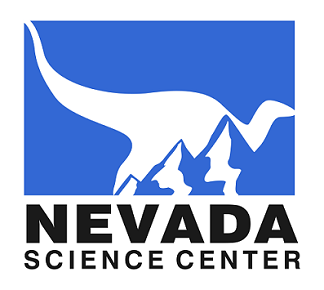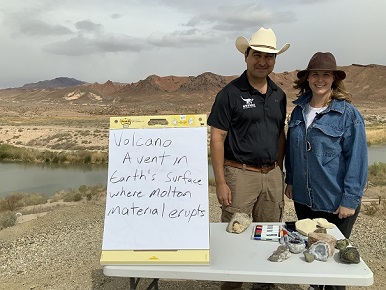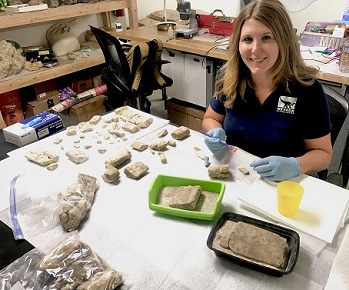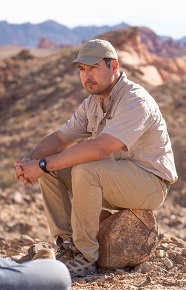
Founded by two active research paleontologists, the Nevada Science Center launched with the idea to bring communities together through science education and research. Rebecca Hall and Dr. Joshua Bonde bring their experience as researchers and as educators together to provide a community-based science center with a mission dedicated to delivering science education and learning opportunities to the public. We asked them a few questions about their passion for STEM.

Why is STEM important to you?
STEM is important to the Nevada Science Center because it stirs up the questions and curiosity needed for discovery and innovation. For the paleontologists at the Science Center, their background in the STEM fields of geoscience and paleontology has led them to countless fossil discoveries across the State, and most recently, naming Nevada’s first dinosaur, Nevadadromeus schmitti. Being connected to STEM topics develops an inspired, knowledgeable community that builds personal confidence, core values, and a better understanding of the world around us.
Who is your target audience and how do you engage them in your programs?
It is Nevada Science Center’s mission to Lead community science education through impactful programs and diverse learning opportunities to effectively engage people of all ages and backgrounds, despite their economic circumstances or geographic location. The Nevada Science Center’s goal is to provide virtual and traditional opportunities to enhance learning excitement for students in the classroom, at home, or in alternate venues. We bring science topics direct to our community, to fit the needs of students and educators. From scheduled LIVE Virtual Field Trips where we share the natural beauty and science from around the state, to our in-class outreach programs, the Nevada Science Center is here to help educators supplement their curriculum to keep Nevada’s youth engaged in STEM. Our programming currently focuses on K-12 students; however, we have bigger plans for more adult programming as well. We want our reach to include all of Nevada, not just our home base in Henderson.
What inspired your organization to embrace STEM or what inspired you to start an organization that embraces STEM?
As two scientists who co-founded the Nevada Science Center, it was a vision through our experiences, and lack thereof in part, that made our vision come to reality. Everyone has different experiences growing up either through different traditions, cultures, family life, or the education we receive; it is what makes us all unique. It’s these experiences that influence us, who we become, and what we decide to pursue. We recognize there are areas in both traditional and nontraditional education settings where STEM opportunities could be more available. A key feature of a successful community is access to quality education which in turn drives development and prosperity. The Nevada Science Center envisions becoming a leader in community science education by offering impactful programs and diverse learning opportunities. By developing programs that engage people of all ages and backgrounds, we hope to inspire the public through education, awareness, while presenting a wide range of STEM topics. We want to make scientific connections to Nevada’s melting pot of rural and urban communities, like the Basin and Range, it brings everyone together-- making Nevada home.
What sets your organization apart from others who offer STEM opportunities to the community?
The Nevada Science Center embraces the idea of connecting Nevada together as a COMMUNITY through science. As paleontologists, it seems we get a few bonus points connecting STEM topics within our communities thanks to Hollywood and Steven Spielberg. But all jokes aside, the personal values we hold within our own family, we extend to our community as well. We engage personably and encourage the public; we seek new impactful ways to do so. Recently, we placed a learning table in the middle of our paleontology lab to encourage guests to interact, get messy, and conduct experiments right alongside us as professional scientists.

Creating a STEM community also means being able to connect with rural and urban communities. As we get to crisscross the state, looking for the next discoveries, we also appreciate being involved in the smaller communities we conduct our field work around. Not only bringing awareness of STEM topics to them but returning to the city to share with our urban community members what Nevada has to offer outside the busy lights. We surprise locals in Eureka by finding a new dinosaur in the hills, then we inform our patrons in Henderson about the intriguing small historic mining town that is Eureka.
Our Virtual Field Trip Program provides us with another way to encompass this vision. Streaming LIVE from different parts of Nevada, we share STEM topics from geology, dinosaur digs, and natural sciences, delivered to students virtually across the State and now internationally! We enjoy captivating students with Nevada STEM topics through educational entertainment but also highlighting the different communities to which we are all connected as Nevadans.
Can you share a story about a STEM success?
The Nevada Science Center would like to share Dr. Joshua Bonde’s STEM success story. He is one of the founders of the Nevada Science Center, Director of Research, and a proud Indigenous Scientist. Dr. Bonde is a registered member of the Te-Moak Band of Western Shoshone, a tribe based in Wells, NV. He grew up on his family farm in Fallon and is passionate about creating STEM opportunities for students in underrepresented communities. He is vocal about bringing cultural inclusiveness to the STEM community and is happy to support anyone looking for advice. Dr. Bonde graduated from Churchill County High School in Fallon, received his B.S. in Biology at University Nevada Reno, a M.S. in Earth Sciences at Montana State University-Bozeman, and came back to Nevada to earn his Ph.D. in Geoscience. Dr. Bonde sets an example not only for Indigenous peoples to achieve something big but is an inspiration to many when you meet his down-to-earth, compassionate, and inspirational personality.

Who are your community partners and how do they add to the quality of your programs?
We value all our community partners because we do believe “It takes a village to raise a child.” We enjoy collaborating and working with other organizations to have more meaningful and impactful STEM programming. There are a few partners that we most certainly want to recognize for their continued support.
First, Mr. Ralph Krauss who is a visionary educator and launched Edutainment Learning with the idea of entertaining while inspiring students. His passion led to the idea of connecting students with primary sources of education using technology. Mr. Krauss teamed up with Nevada Science Center to become partners in our Virtual Field Trips. His expertise and technological knowledge allow us to broadcast to students around the world from remote areas of the great state of Nevada!
We also appreciate our partnership with Nevada State Parks. Their partnership has trusted us to conduct our paleontological research in Parks across the State to preserve Nevada’s prehistoric past. They have also been very welcoming in collaborating with us on several Virtual Field Trips direct from the Parks with their insightful park rangers. Working together we have been able to share Nevada’s Parks and the STEM treasures they hold to the world.
Lastly, our partnership with the Clark County School District has allowed our reach to impact 10’s of thousands of students. Mrs. Cheryl Wagner from the partnership office helps get our programming events to the teachers across the county. Informing teachers about our event and virtual programs has allowed for the Nevada Science Center to be involved in schools despite the hardships of the pandemic.
We are also looking forward to the airing of the PBS Vegas STEAM Camp episode this spring where we filmed at one of our dinosaur dig sites! We are confident Nevadans across the state will enjoy the program and learn more about Nevada’s prehistoric past and the science behind our careers as paleontologists. We are always happy to find new collaborations and partnerships!